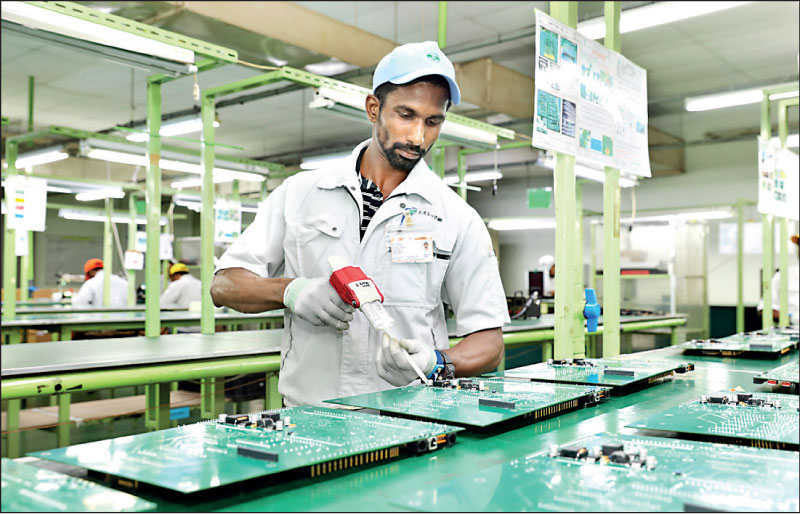Wednesday Feb 18, 2026
Wednesday Feb 18, 2026
Thursday, 6 July 2023 00:42 - - {{hitsCtrl.values.hits}}

 Sri Lanka is at a crucial juncture in its economic development, with the International Monetary Fund coming to the rescue for the 17th time after declaring bankruptcy after 74 years of independence. The country’s outdated labour laws must undergo significant reforms to progress and attract foreign investment. The existing legislation, some of which date back a century, has proven to be complex, discriminatory, and inflexible, hindering local industries and foreign investors. There is an urgent need for labour law reforms in Sri Lanka, considering the current budget state, stakeholder consultations, and the Government’s objectives.
Sri Lanka is at a crucial juncture in its economic development, with the International Monetary Fund coming to the rescue for the 17th time after declaring bankruptcy after 74 years of independence. The country’s outdated labour laws must undergo significant reforms to progress and attract foreign investment. The existing legislation, some of which date back a century, has proven to be complex, discriminatory, and inflexible, hindering local industries and foreign investors. There is an urgent need for labour law reforms in Sri Lanka, considering the current budget state, stakeholder consultations, and the Government’s objectives.
Why should the 100-year-old Sri Lankan labour laws be reformed?
The budget for 2023 proposed a unified labour code to be implemented by May 2023. Recognising the need for reform, the incumbent Minister of Labour and Foreign Employment Manusha Nanayakkara, has initiated stakeholder consultations, with the first draft set to be presented for internal discussions on 6 July 2023 at the National Labour Advisory Council. Several reasons necessitate the reform of the existing labour laws:
a. Complexity and discrimination: The existing labour laws in Sri Lanka are characterised by ambiguity, complexity, and discrimination. With over 38 labour laws, some of which are considered archaic, currently in place, which need to be uniformly applied, the system treats different sectors and employees differently. This inconsistency hampers fairness and inhibits a conducive business environment.
b. Inflexibility: The rigid nature of the current labour laws fails to account for economic crises, industry downturns, and bankruptcy situations. These laws must provide the necessary flexibility to adapt to changing circumstances, negatively impacting employers and employees.
c. Lack of focus on productivity and competitiveness: The existing labour laws need to adequately consider factors such as labour cost for productivity, competitiveness, overall productivity, and efficiency of private sector enterprises. By paying attention to these crucial elements, the laws hinder Sri Lanka’s ability to attract foreign investors and compete globally.
d. Limited opportunities for part-time and flexible work: The current labour laws do not facilitate part-time or flexible employment options, negatively affecting women and individuals seeking alternative work arrangements. Such restrictions are seen as discriminatory and prevent Sri Lanka from fully harnessing the potential of its workforce.
The Government’s considerations in reforming the labour laws:
The Sri Lankan Government has taken various factors into account in its endeavour to reform the labour laws:
a. Female workforce participation: With a female workforce participation rate of 32.2%, the labour laws must facilitate and encourage more women to enter the workforce. Reforms should address gender disparities and create a supportive environment for women in employment.
b. Low productivity levels: Despite having a literacy rate of approximately 93%, one of the highest in the world, Sri Lanka’s workforce productivity ranks low at 152 globally. Excessive leave entitlements and related inefficiencies contribute to this issue, emphasising the need for reforms that enhance productivity.
c. Foreign investment: Sri Lanka aims to attract significant foreign investments, targeting around $ 15 billion annually. However, it has struggled to surpass $ 1.5 billion over the past decade. Reforms in labour laws are essential to creating a business-friendly environment that appeals to international investors.
d. Economic complexity: Sri Lanka’s economic complexity index is 108 globally, reflecting challenges in generating sufficient wealth and job opportunities for its citizens. The Government aims to address investment that can bring in complex industries and export-oriented economic growth by making labour laws simple for employers and employees.
e. United Nations’ Sustainable Development Goals: Reforming labour laws should align with the United Nations’ Sustainable Development Goals (SDGs), particularly SDG 8, which aims to promote gender equality Labour Rights, sustained economic growth, productive employment, and decent work. SDG 8 seeks to promote labour rights, including those that are enshrined in International Labour Organisation Conventions, such as ILO 102 – Social Security (Minimum Standards) Convention, 1952 (No. 102) ILO 118 – Equality of Treatment (Social Security) Convention, 1962 (No. 118) ILO 157 – Maintenance of Social Security Rights Convention, 1982 (No. 157) ILO Rec 202 – Social Protection Floors Recommendation, 2012 (No. 202).
Objectives of reforming the labour laws:
The reform of Sri Lanka’s labour laws must align with specific objectives:
a. Job creation: Private sector job creation is vital for future economic growth. Reforms should prioritise the contribution of small and medium-sized enterprises (SMEs) and encourage entrepreneurial activities to drive employment opportunities.
b. Ensuring global competitiveness: Reformed labour laws should enable local industries to compete effectively globally without undermining foreign direct investments (FDIs). Balancing the needs of domestic industries and the attraction of international investors is crucial for sustainable economic growth.
Proposed reforms:
The proposed labour law reforms extend beyond mere expansions or redefinitions. They encompass futuristic outlooks, supplementation of existing legislation, and institutional reforms within the labour department. The proposed reforms encompass a wide range of areas, aiming to modernise and enhance Sri Lanka’s labour laws: Notable reforms include:
a. Abolishing wages boards: Certain legislations, such as the wages board, would be abolished, and a National Council for Wages has been proposed to streamline decision-making regarding salaries and leaves.
a. Social security and unemployment insurance: The Government seeks to establish a contributory unemployment insurance system to protect workers during a job loss. This social security initiative aims to create a safety net for individuals while creating more jobs.
b. Maternity benefits: The Government plans to offer maternity benefits through a social security fund to promote female workforce participation. By compensating employers for productivity losses during maternity leave, this initiative aims to support working mothers and encourage gender equality in the workforce.
c. Digitalisation and monitoring: Reforms include the digitalisation of the labour department, introducing a labour market information system for effective policy formation, and the implementation of e-wages to ensure timely payment of employee benefits such as the Employees’ Provident Fund (EPF) and Employees’ Trust Fund (ETF).
d. Formalisation of informal sector: The proposed reforms also involve bringing jobs from the informal sector into the formal economy. Occupational licensing programs and establishing a Skill Quality Authority aim to enhance the dignity of labour and monitor previously unregulated jobs. A payment monitoring mechanism is vital to ensure social security contribution for workers in the formalised informal sector.
e. Reforms will address night-time restrictions, overtime regulations, the Termination of Employment of Workmen Act (TEWA) rigidity, occupational safety and health, sexual harassment, and part-time/flexible work arrangements.
Reforming Sri Lanka’s century-old labour laws is urgently necessary for economic growth and attracting foreign investment. The existing laws’ complexity, rigidity, and discriminatory nature hinder the development of a dynamic and competitive labour market. By considering factors such as productivity, gender equality, and global competitiveness, the proposed reforms seek to create an environment conducive to job creation, empower SMEs, and position Sri Lanka as an attractive destination for local and foreign investors. The Government’s commitment to reforming labour laws is crucial to fostering economic prosperity and securing a brighter future for Sri Lanka.
(The writer is an advisor to the Ministry of Labour and Foreign Employment.)